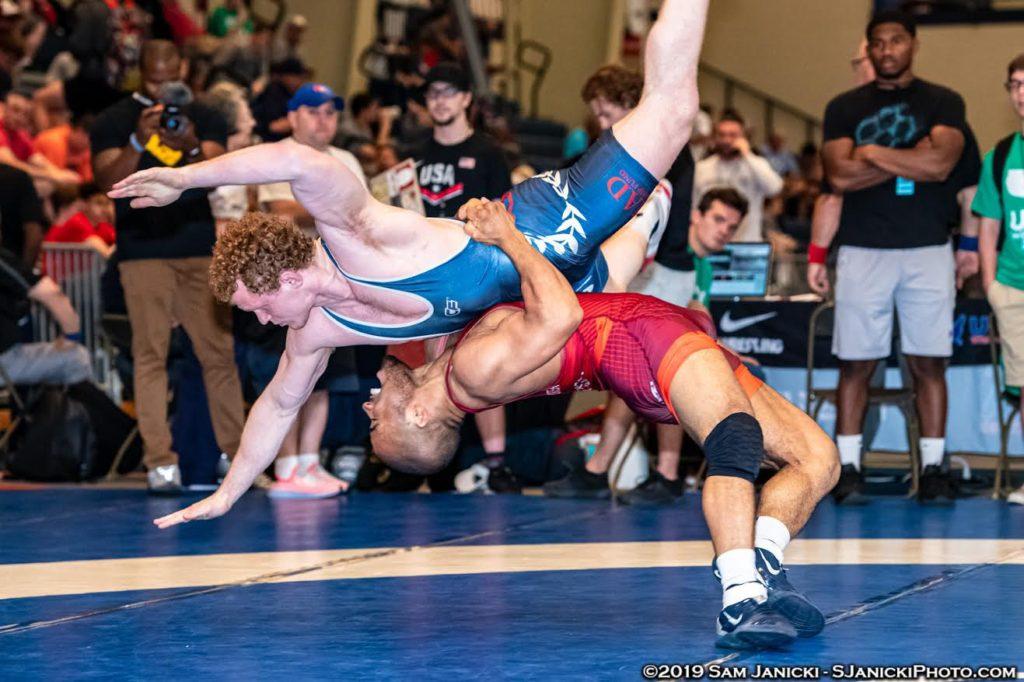Ten times a week, the 48 members of NMU’s Olympic Greco-Roman wrestling team gather on the second floor of the Superior Dome for practice. The room is large—the floor covered in padded mats to soften falls. Nearly 30 person-sized stuffed leather practice dummies line the far wall leading to the weight training area.
Climbing ropes hang from the peak of the ceiling. Even after an intense practice, the athletes are tasked with climbing up and down eight times using only their arms. Coach Andrew Bisek said he believes in pushing the athletes to be the best they can.
The competitive attitude runs from the coaching staff down to the wrestlers. Although there are numerous competitions every year, Bisek preaches selectiveness, or going to certain meets.
“I don’t want people to go somewhere just to feel good. I want them to know that we’re trying to achieve something harder. If you go beat some of the best countries, then that’s good,” Bisek said.
The coaching staff pushes the athletes to enter the toughest tournaments, Bisek said. Losing a match stings no matter who i is against, but losing often leads to learning, which leads to getting better, he said.
“If you win, it assures that you can compete with the best. But if you lose, you say ‘Okay, I got a taste of what the best is.’ [The drive] has to come from somewhere internal,” Bisek said.
Practices are where it all begins. The old phrase, “You play how you practice,” rings true for the team. Not only is their intense focus on physical strength and conditioning, but small details that can make a good wrestler great.
Greco-Roman wrestling is similar to other forms of wrestling with the stipulation that there are no leg attacks or takedowns. Eliminating the lower half of the body limits the moves one can perform and also gives way to a lot of subtleties.
“You find a lot of situations where the slightest pressure gets a reaction and something that wasn’t there [before] becomes open,” Bisek said.
Graduating from NMU is not necessarily the end of the line for a wrestler. There are guys who stay in Marquette after graduation to continue training with the team at the facility. The staff welcomes this, finding it benefits the younger athletes.
“They’ve done a great job of helping the 18 year old kids here. They’ll say, ‘No this is the way that you do it.’ Not only wrestling wise, but saying, ‘This is how you have to train, this is how you have to live.’ You need to be an adult now,” Bisek said
Although the student body may be aware that these Olympic programs are on campus, that is often the extent of it, Bisek said. The calendar for competitions in 2019 looks like an 18-year-olds gap year travel plans: Sweden, Budapest, St. Petersburg—even the team’s domestic events will take them to New York City and Fort Worth, Texas before the year is up.
“As far as support, it’s hard. There’s one other college that has full-time Greco athletes and it’s in Arkansas. That program just started a few years ago. But where do we go and compete? Overseas. So it’s tough to go out and support the team,” Bisek said.
To remedy this issue he has considered adding bleachers or extra chairs in the practice facility and opening the doors to the public for live practices.
Senior entrepreneurship major and veteran team member Jesse Porter has been wrestling since third grade. Now, at NMU, Porter is a full time student along with his responsibilities to the team.
“It’s kind of a family affair for me. Both my sisters wrestled, my mom wrestled and my dad wrestled. I grew up around wrestling—I started to like it on my own because I was exposed to it so much,” Porter said.
His father’s philosophy was similar to that of Bisek’s. He competed in advanced age groups and weight classes since the beginning, Porter said. At that age, a year’s difference meant facing opponents who were taller, bigger and stronger.
“I’d get the s*** kicked out of me for the longest time and after every tournament he’d ask me, ‘Alright, so, you wanna quit?’” Porter said.
But Porter didn’t. Instead, he asked his dad to teach him how to be better, how to win. Learning these lessons at a young age instilled a competitive drive that fits the Olympic Training Site (OTS) team’s mission perfectly.
NMU’s program is the longest running full time Greco program in the country, celebrating its 20th anniversary in 2019. The only other program of its kind was started three years ago at Williams Baptist University in Walnut Ridge, Arkansas.
“Our coaching staff is really strong. They are extremely experienced—I think Andy does a great job on that front,” Porter said.
The demand for excellence doesn’t stop when the athletes leave the facility. Everyone is required to meet a required number of study hours each week, ensuring that they are well rounded and ready for the work force after graduation, he said.
“It’s similar to what other athletes do but it’s on a different level,” Porter said. “If you look at Division I athletes, they do a lot of the same stuff we do, the only difference is we do it year round.”
From December 20 to 22, members of the teams will be traveling to Fort Worth, Texas for the Olympic trial qualifiers for the forthcoming games. The top five from that tournament qualify for the trials, which then selects one athlete per weight class to represent the United States. Bisek is excited to see what happens, adding that four or five guys have a really good shot at making the 2019 Olympic team.






























